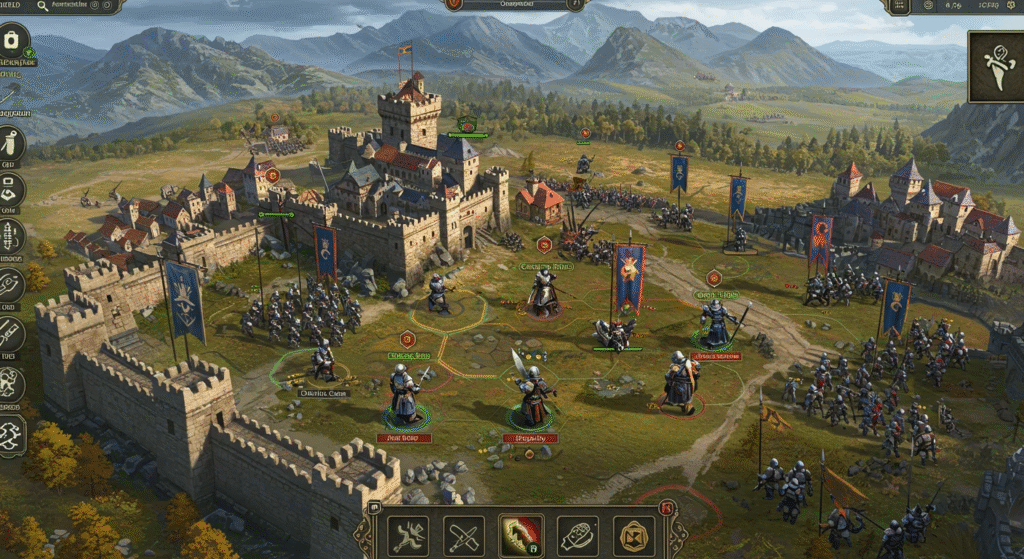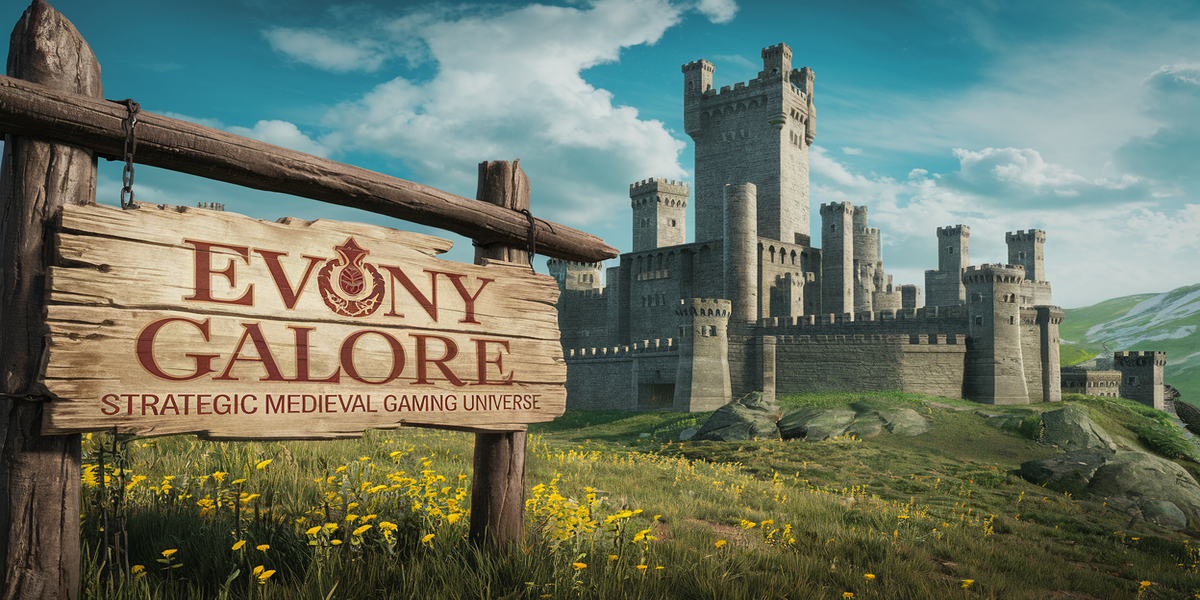In the vast and competitive landscape of mobile strategy games, few titles command the presence and provoke the passion of Evony: The King’s Return. It is a world of medieval conquest, mythical beasts, and grand historical alliances, all built upon a foundation of relentless resource management and strategic warfare. Yet, to truly understand the ecosystem of Evony, one must become familiar with a term that has emerged from its player base, a word that encapsulates both the game’s greatest allure and its most profound challenges: Evonygalore.
“Evonygalore” is not an official term found in the game’s tutorial or marketing materials. It is a piece of player-generated lexicon, a portmanteau of “Evony” and “galore,” meaning “in abundance.” It describes a state of affairs, a strategic approach, and a cultural mindset all at once. At its simplest, Evonygalore refers to the overwhelming abundance of activities, resources, events, and choices that a player must navigate daily. It is the feeling of logging in to find ten simultaneous events, five alliance requests, three monster rallies, and a battlefield registration about to close. It is the paradox of having so much to do that one can become paralyzed, and the strategy of learning to thrive within this chaos. This article will deconstruct Evonygalore, exploring its manifestations, the strategies to master it, and its implications for the modern gamer.
Part 1: The Many Faces of Abundance – Defining the Evonygalore Experience
Evonygalore manifests in several key areas of the game. This abundance is not accidental; it is a core design principle intended to engage players of all types and commitment levels, ensuring there is always a reason to log in.
1. The Event Galore: A Perpetual Carnival
The most immediate sensation of Evonygalore is the event schedule. There is never a dull moment. At any given time, a player might be participating in:
- The King’s Gate: A sequential, stage-based PvE event offering valuable rewards.
- Server War / Battlefield: Large-scale, cross-server PvP combat that tests alliance coordination.
- Civilization Treasure: A building-oriented event requiring strategic resource expenditure.
- Killing Event: A competition to earn points by defeating enemy troops or neutral monsters.
- Spending Event: An event that rewards players for using in-game currencies like gems and gold.
- Limited-Time Themed Events: Holiday events or special collaborations that introduce unique mechanics and rewards.
This “event galore” creates a sense of a perpetual carnival. There is always a prize to chase, a ladder to climb, a ranking to achieve. For the active player, it provides a constant stream of objectives. However, it also fosters a sense of obligation—the fear of missing out (FOMO) is a powerful psychological driver. If you take a day off, you might fall behind in a crucial event, missing out on a general, a dragon, or a powerful equipment blueprint that your rivals are acquiring.

2. The Resource Galore: The Engine of Empire
Resources are the lifeblood of Evony. Food, lumber, stone, ore, and gold are required for everything from training troops and researching technology to constructing buildings and healing the wounded. Evonygalore in resources refers to two phases: the accumulation and the expenditure.
- Accumulation Galore: Players have a plethora of ways to gather resources: farming tiles on the world map, building resource spots within their city, completing events, opening chests, and purchasing packs. A high-level player’s inventory can be overflowing with millions, even billions, of units of each resource, stored in resource items that prevent them from being plundered.
- Expenditure Galore: This is where the abundance meets its purpose. A single end-game research upgrade in the Academy can cost hundreds of millions of resources. Training a full march of top-tier troops can drain stockpiles in minutes. The “Spending Event” directly incentivizes this cycle: hoard resources during a lull, then unleash them during a spending event to gain double the benefit—progress on your city and top-tier event rewards.
This cycle of hoarding and spending is a fundamental rhythm of the game. Managing this resource galore—knowing when to save and when to splurge—is a critical skill. A player who spends recklessly outside of an event will progress slower than one who strategically times their expenditures.
3. The General and Dragon Galore: A Pantheon of Power
Evony features an immense roster of historical and mythological figures, from George Washington and Cleopatra to Roland and Elektra. Each general has unique skills, specialties, and stats suited for different roles: leading cavalry, defending walls, overseeing subordinate cities, or increasing construction speed. Similarly, dragons and other spiritual beasts can be hatched and nurtured, providing powerful buffs to their assigned generals.
This “general galore” is a classic example of abundance as a progression system. A new player starts with a few basic generals, but soon discovers a vast universe of possibilities. Acquiring these generals—through tavern recruitment, historical city relics, event rewards, or the infamous “wheel of fortune”—becomes a primary driver of gameplay. The strategic depth comes from assembling synergistic combinations: a duty officer who reduces building time, a wall general who boosts ranged attack, a mounted PvP general with a dragon that increases troop load. The sheer number of combinations is staggering, allowing for highly customized playstyles but also requiring significant research and investment to optimize.
4. The Alliance Galore: The Social Fabric
No player is an island in Evony. The alliance is the fundamental social unit, and here, too, Evonygalore applies. A server is populated with dozens of alliances, each with its own culture, rules, and level of activity. An active alliance provides a “galore” of benefits:
- Help: Alliance members can reduce each other’s construction and research times.
- Teleports: Alliance territory provides a safe zone and free teleports for members.
- Rallies: Coordinating rallies against powerful Boss Monsters or enemy keeps is essential for resource gathering and event scoring.
- Knowledge Sharing: Veteran players guide newcomers through the game’s immense complexity.
The social dynamics within an alliance are a game unto themselves. Diplomacy between alliances, negotiating Non-Aggression Pacts (NAPs), and organizing for server-wide wars create a rich, political meta-game. For many, the alliance is what transforms Evony from a solitary grind into a compelling social experience. The “alliance galore” means there is always someone to talk to, a strategy to discuss, or a rally to join.
Part 2: Mastering the Glut – Strategic Principles for Thriving in Evonygalore
Navigating the abundance of Evonygalore is the key difference between a player who merely participates and one who thrives. Success is not about doing everything, but about doing the right things with focus and efficiency.
1. The Art of Strategic Neglect: You Can’t Do It All
The first and most important lesson for any Evony player is to accept that it is impossible to excel at every aspect of the game simultaneously. A player who tries to top the charts in every event, max out every general, and dominate in every battlefield will quickly burn out or go bankrupt. The principle of strategic neglect is essential.
This means consciously choosing which parts of the Evonygalore to focus on and which to treat as secondary. A player might decide:
- “I am a farmer.” Their focus is on resource production and gathering. They prioritize economic generals, avoid unnecessary PvP, and build a strong defense to protect their stockpiles. They excel during resource-gathering events.
- “I am a warrior.” Their focus is on PvP combat. They invest heavily in attack-oriented generals, powerful troops, and military research. They live for the Battlefield and server wars, and their resource strategy is often based on plundering others (“ghost hunting”).
- “I am an event specialist.” This player is a master of efficiency. They hoard resources and speed-ups meticulously, only spending them during optimal events to maximize their reward output. They may not have the biggest army, but they progress steadily and smartly.
By defining a primary role, a player can filter the noise of Evonygalore and allocate their time and money effectively.
2. The Hoarder’s Creed: Patience is Power
Impulsivity is the enemy of progress in Evony. The game is deliberately designed to tempt players into instant gratification. The strategic approach, however, is one of extreme patience. This is the “Hoarder’s Creed.”
- Speed-ups: Never use speed-ups as soon as you get them. Save them for “Power Up” events or to quickly rebuild after a war.
- Resources: Keep the bulk of your resources in protected items within your inventory. Only have out what you need for immediate use to avoid being a tempting target for plunderers.
- Gems: Gems are a premium currency used for everything from unlocking second construction queues to purchasing rare items. Spending gems frivolously is a cardinal sin. They should be saved for critical upgrades or specific gem-spending events.
- General Tokens: Fragments for summoning or ascending generals should be accumulated until you have a clear plan for which general you want to build.
This discipline transforms the overwhelming abundance of items into a strategic arsenal, ready to be deployed at the most opportune moment. The player who hoards effectively will consistently outperform the player who spends recklessly, even if the latter spends more real money.
3. Knowledge as the Ultimate Resource
In a environment of Evonygalore, where choices are abundant and mistakes are costly, information becomes the most valuable currency. The game’s own tutorials are insufficient for the late-game complexity. Consequently, a vast ecosystem of third-party resources has emerged to help players navigate the glut.
- Wiki Pages and Online Guides: Detailed databases list general skills, dragon stats, equipment recipes, and event requirements.
- YouTube Channels: Content creators provide visual guides, strategy breakdowns, and reviews of new generals and events.
- Discord Servers: Dedicated communities allow players to ask questions, share tips, and discuss server politics in real-time.
A player who actively seeks out and absorbs this knowledge can make informed decisions. They know which generals are “traps” (poor investments), which research paths are most efficient, and how to best prepare for an upcoming event. In the face of Evonygalore, research is not optional; it is a core survival skill.
4. The Social Contract: Thriving in an Alliance
As mentioned, the alliance is central to the experience. Mastering Evonygalore is a team effort. A successful alliance will coordinate its activities to maximize collective benefits.
- Rally Coordination: Timing monster rallies so all online members can join maximizes loot for everyone.
- Resource Assistance: Sharing resources with members who have been attacked (zeroed) helps them recover quickly.
- Strategic Specialization: An alliance benefits from having a mix of player types—some focused on defense, some on attack, some on resource support.
The social aspect also provides accountability and motivation. The shared goal of climbing the alliance rankings or winning a server war turns the individual grind of Evonygalore into a collective mission.
Part 3: The Dark Side of Abundance – The Psychological and Financial Toll of Evonygalore
For all its strategic depth and social engagement, the philosophy of Evonygalore has a significant dark side. The very abundance that creates engagement can also lead to negative player experiences.
1. The Pay-to-Win Spectrum
Evony is a free-to-play game, but its core mechanics are deeply intertwined with microtransactions. The Evonygalore of events, generals, and resources is, for the developers, a Evonygalore of potential purchases. The game is often cited as a prime example of the “pay-to-win” (P2W) model. Players who spend large amounts of money can accelerate their progress exponentially. They can acquire the best generals instantly, max them out with duplicates, train massive armies overnight, and dominate their servers.
This creates a stark power imbalance. A free-to-play (F2P) or low-spending player can practice perfect strategy and hoarding discipline, but they may never be able to compete with a “coiner” (a player who spends money) of a similar activity level. This can lead to frustration and a sense of futility. The “galore” of opportunities can feel like a “galore” of paywalls. The game’s design expertly uses FOMO to encourage spending, blurring the line between strategic choice and financial pressure.
2. Player Burnout and the Grind
The constant barrage of events and activities can lead to severe player burnout. Evony is not a game you can casually check once a day if you wish to remain competitive. It demands daily, often hourly, attention. Checking in to send out gatherers, join rallies, help alliance members, and monitor events becomes a routine that can feel like a second job. This is often called “the grind.”
The pressure to keep up, especially for leaders within an alliance (like R4s and R5s who manage diplomacy and organization), can be immense. The fear of letting down your alliance mates can turn a fun hobby into a source of stress. Many veteran players eventually quit not because they stop enjoying the game, but because they can no longer sustain the time commitment required to navigate the Evonygalore.
3. The Predatory Nature of Abundance
The design of Evonygalore can be seen as predatory. The overwhelming number of choices, the flashing icons, the limited-time offers, and the layered progression systems are all crafted using well-understood principles of behavioral psychology to encourage prolonged engagement and spending. The line between rich content and manipulative design is thin. For players susceptible to addictive behaviors or with poor impulse control, the game can present a genuine financial risk. Stories of players spending far more than they intended are common within the community.
Conclusion: Evonygalore as a Microcosm of Modern Gaming
Evonygalore is more than just a quirky player-made term for a single game. It is a perfect descriptor for the state of many contemporary live-service games. It represents a paradigm where player retention is built on a foundation of overwhelming content and constant stimulation.
For the player, navigating Evonygalore is a complex dance. It offers a profound sense of progression, a deep strategic challenge, and a vibrant social world. The satisfaction of successfully hoarding for a major event, leading your alliance to victory in a server war, or finally maxing out a legendary general is immense. It taps into our desire for growth, mastery, and community.
Yet, it demands a high price in time, attention, and for some, money. It requires discipline, research, and a healthy dose of self-awareness to avoid its pitfalls. The player must constantly ask themselves: Am I playing the game, or is the game playing me?
Ultimately, Evonygalore is what you make of it. It can be a glorious, abundant playground for empire-building, or an exhausting, bottomless pit of grind and expenditure. The key lies in understanding its nature, setting personal boundaries, and finding the strategic focus that transforms the paralyzing glut into a path to digital glory. In the end, the greatest challenge in Evony: The King’s Return is not defeating the enemy on the world map, but mastering the overwhelming, exhilarating, and often exhausting universe of choices that is Evonygalore itself.

